Man's Jealous Sister Compares His Newly Born "Amazingly Beautiful Girl" To A Dog, Gets Excluded From Being Part Of Her Life
Jealousy is an unpleasant and potent emotion that has the potential to destroy almost any relationship. If not addressed, jealousy can permanently sever one's connection with a spouse and have a detrimental impact on any potential future partnerships.
It is incredible how something that begins in our imaginations can quickly ignite out of control and cause such severe harm. Just as your garden grows with the help of seeds, fertilizer, sunlight, and water, so does jealousy grow when you start imagining what isn't there.
The OP in today's post refers to her sister as being jealous, and we're about to find out why. The OP's sister had an ectopic pregnancy a few years ago, which negatively affected her emotionally and mentally.
The OP and his wife have been walking on eggshells around his sister ever since they announced their first pregnancy. After the OP's wife gave birth to an "amazingly beautiful girl," the OP's sister began acting hatefully toward them.
She would act jealously whenever the OP's parents tried to enjoy time with their granddaughter. The OP's sister even went as far as to say that her dog was more important than their child, and that was the last straw that broke the camel's back.
Find out how the rest of the story unfolded as you keep scrolling below.
The Title...

Ever since that day, she’s acted hatefully towards us.
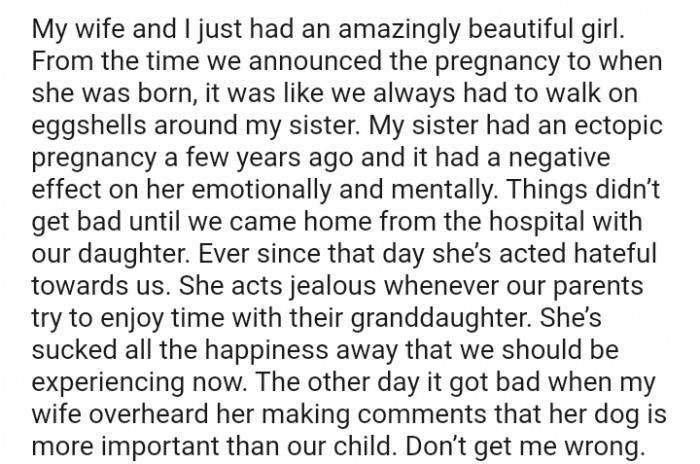
I made it very clear that I don’t want her to have any part of my daughter’s life.
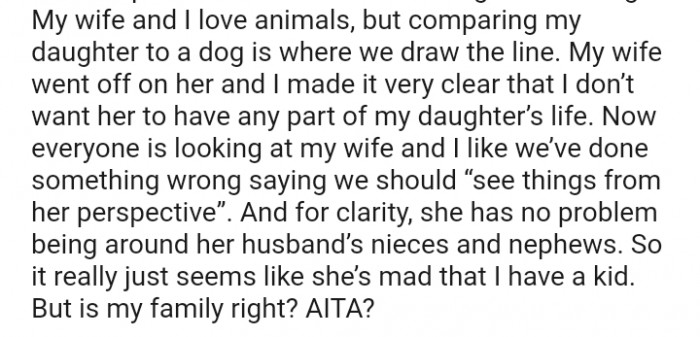
Jealousy often stems from feelings of inadequacy and fear of being overshadowed. According to research published in the Journal of Personality and Social Psychology, jealousy can arise from perceived threats to self-esteem and social identity.
This emotional response may lead individuals to engage in harmful behaviors, such as criticism or exclusion, to protect their sense of self-worth.
Understanding these underlying insecurities can help individuals address their emotions more constructively, fostering healthier communication and relationships.
Fostering Healthy Relationships
Building healthy relationships requires open communication and trust. Dr. Brené Brown, a leading researcher on vulnerability and shame, emphasizes the importance of vulnerability in fostering strong connections.
Encouraging individuals to share their feelings of jealousy without fear of judgment can lead to deeper understanding and empathy. Regular check-ins about emotional well-being can help partners navigate complex feelings and strengthen their bond.
Understanding Jealousy and Insecurity
Dr. Patricia Larson, a developmental psychologist, explains that jealousy often stems from feelings of insecurity or inadequacy.
In this case, the sister's comparison of her brother's daughter to a dog may indicate deep-seated issues regarding self-worth and familial comparisons.
Such behavior can be a projection of one’s insecurities onto another, a common defense mechanism seen in familial relationships.
And the comments roll in...
It's incumbent on you to protect your child.
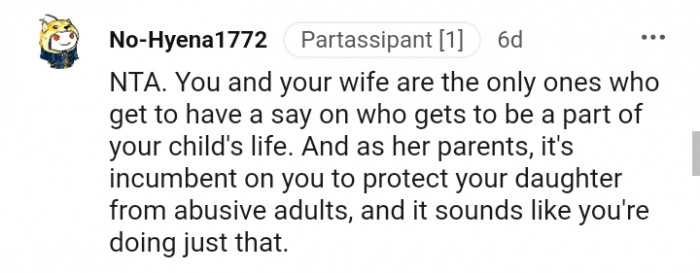
You can be understanding of her pain.

She's not dealing with her grief and anger.

The Role of Social Comparison
Social comparison theory suggests that individuals evaluate their worth based on comparisons with others, which can exacerbate feelings of jealousy. Dr. Leon Festinger, who introduced this concept, noted that when someone perceives another's success, it may trigger insecurity.
This is particularly relevant in familial relationships where sibling rivalry can manifest. Addressing these feelings openly can help mitigate the negative impact of such comparisons, as research shows that fostering empathy and support can promote healthier dynamics.
Research in the Journal of Abnormal Psychology suggests that individuals with unresolved self-esteem issues often engage in negative comparisons to cope with their feelings of inadequacy.
This pattern can erode relationships and create a toxic family environment.
There is no need for that negativity around your child.
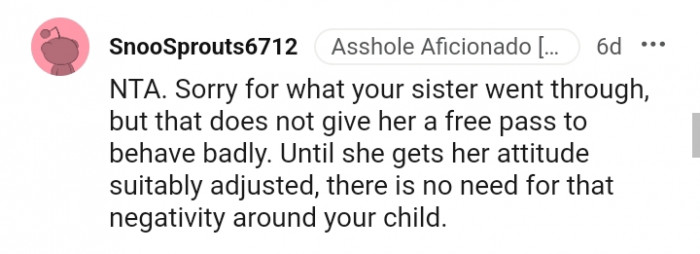
Hearing a dog is more important than her?
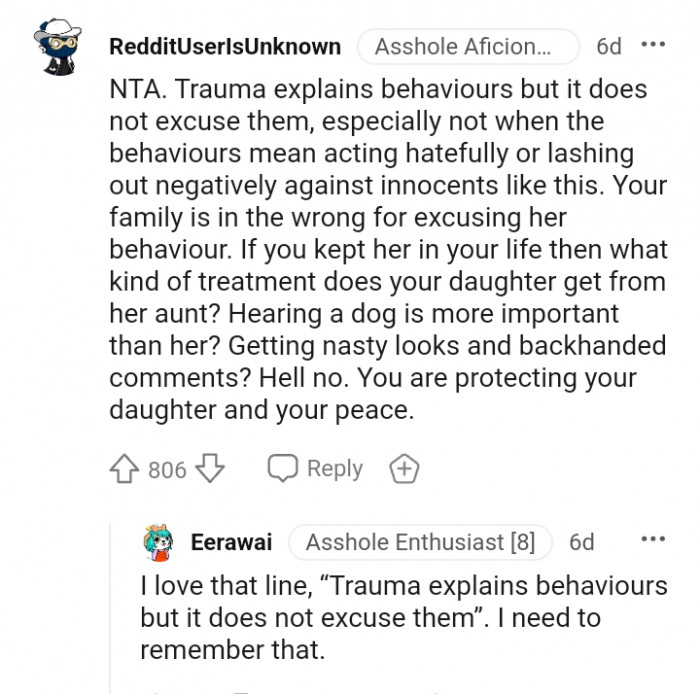
Ill people should be held responsible for their behavior.
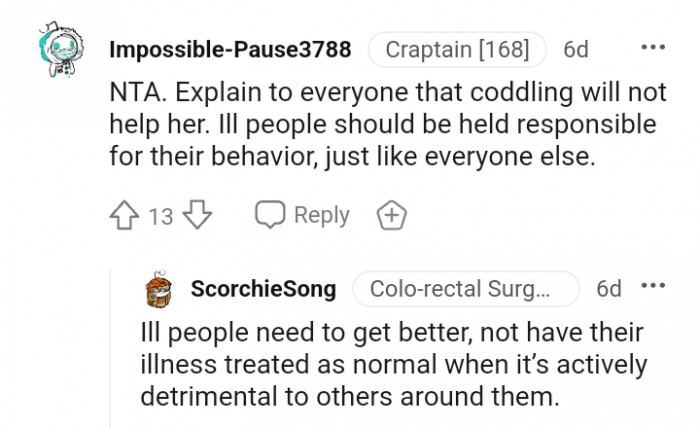
Jealousy can lead to significant relationship strain, often resulting in conflict and emotional withdrawal. Dr. John Gottman, a prominent relationship researcher, emphasizes that jealousy is a predictor of relationship breakdowns.
His studies suggest that couples who openly discuss their insecurities and feelings of jealousy can strengthen their bonds. Practical strategies include active listening and validating each other’s feelings, which can transform jealousy into constructive discussions rather than destructive arguments.
The Cycle of Comparison in Families
Psychologists warn that comparisons within families can lead to a cycle of jealousy and resentment, fueling further conflict.
Understanding this cycle is crucial for breaking the pattern and fostering healthier family dynamics.
Recognizing and validating individual achievements can help counteract these harmful comparisons.
Your family is enabling this, and they should stop.

I feel like this part was breezed through.
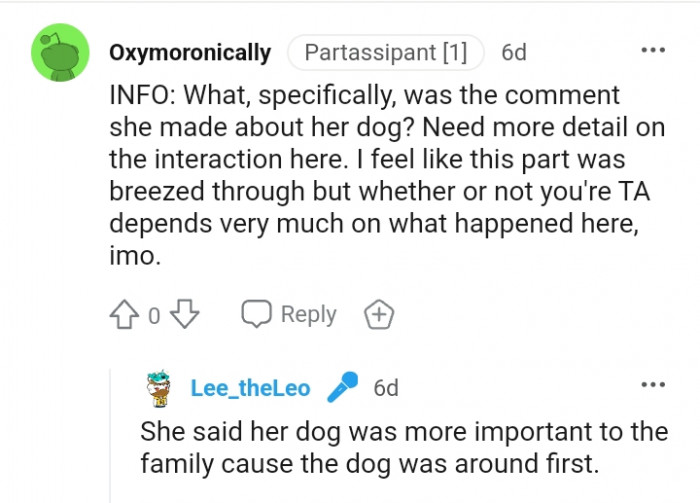
Her trauma does not excuse her behavior.

Impact of Childhood Experiences
Research indicates that childhood experiences play a critical role in shaping adult jealousy. According to Dr. Mary Main's attachment theory, individuals with insecure attachment styles are more prone to jealousy in adult relationships.
These individuals may struggle with trust and fear of abandonment, leading to negative behaviors. Understanding one’s attachment style can provide insight into these tendencies, allowing for personal growth and healthier relationship patterns.
To address these issues, experts recommend fostering a culture of celebration rather than comparison in families.
Encouraging family members to acknowledge each other’s successes and unique qualities can mitigate feelings of jealousy.
Creating an environment where everyone feels valued can strengthen familial bonds and promote emotional well-being.
It's a horrible feeling to be unwanted by your own family.
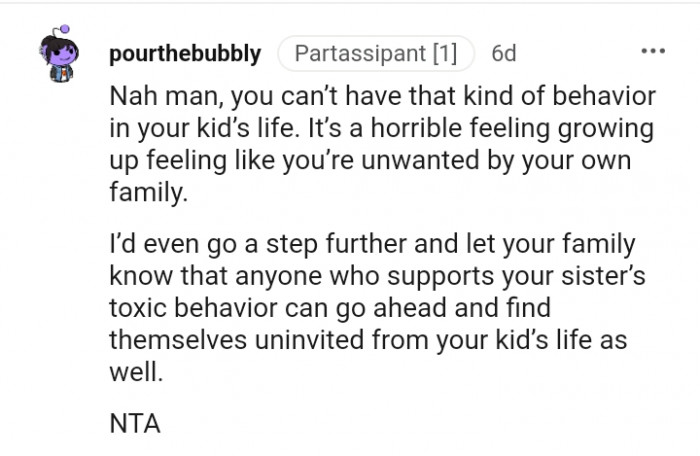
What she said is disgusting and disrespectful.
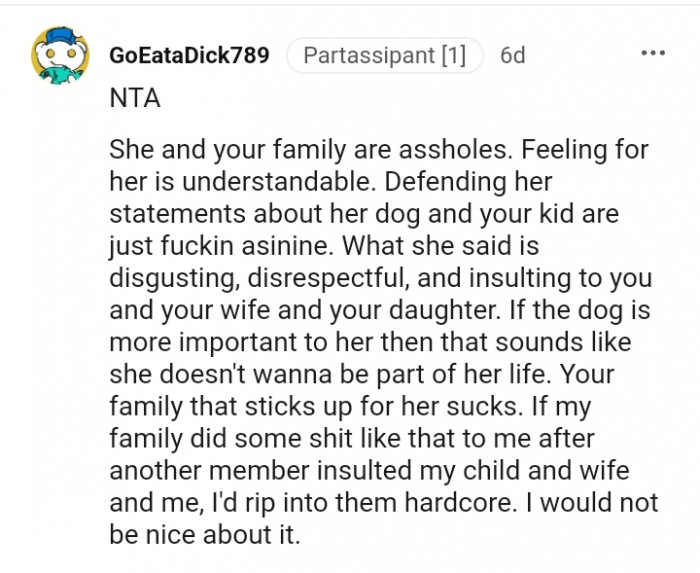
Cutting her off entirely seems a little extreme.
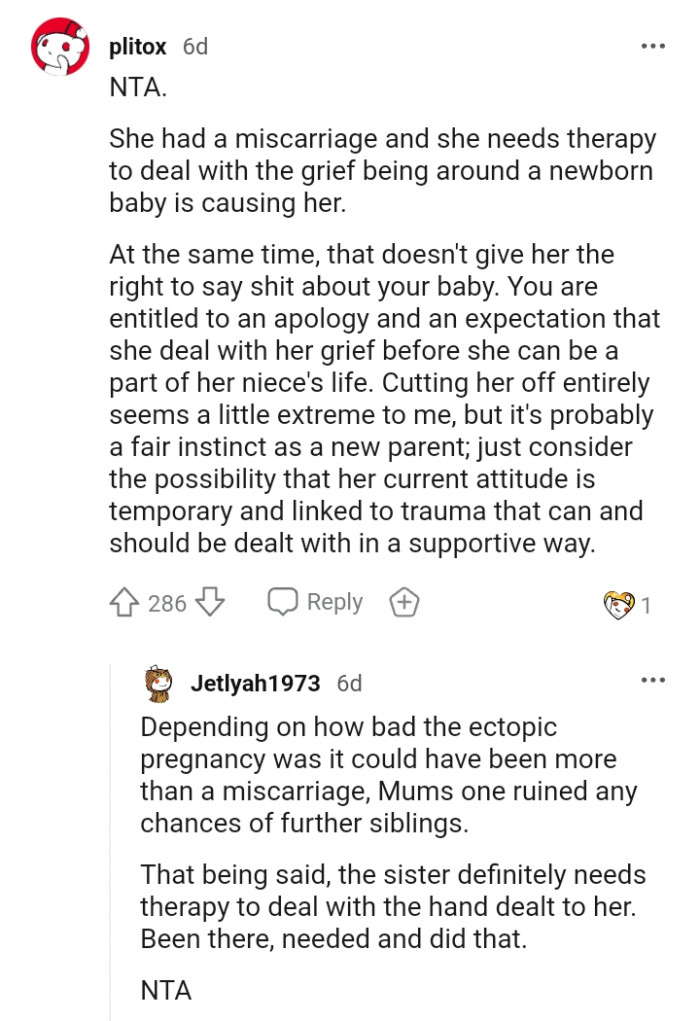
Addressing jealousy involves recognizing the emotion as a signal rather than a directive. A clinical psychologist emphasizes that acknowledging jealousy can lead to self-reflection and personal development.
Practicing self-compassion and mindfulness can help individuals respond to jealousy more productively. Techniques such as journaling or cognitive restructuring can allow individuals to challenge negative thoughts, ultimately fostering emotional resilience and healthier interactions.
None of this is your fault.
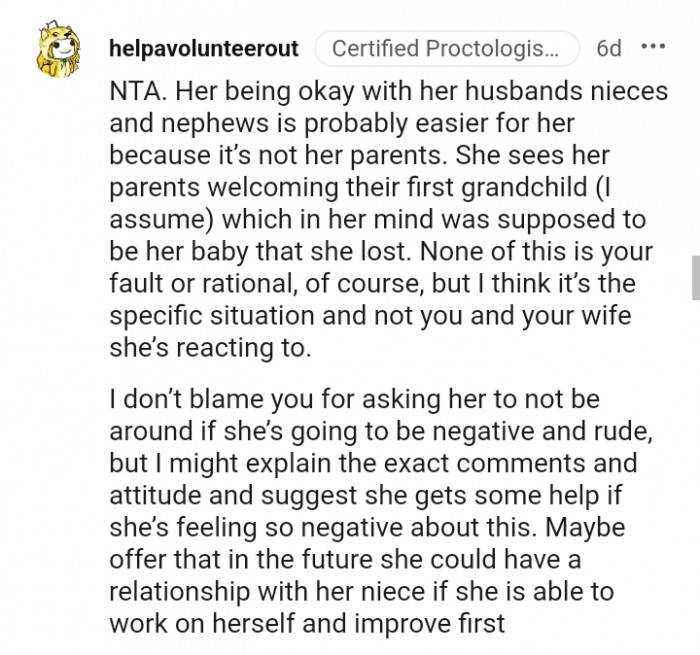
This Redditor thinks the OP made a good choice.
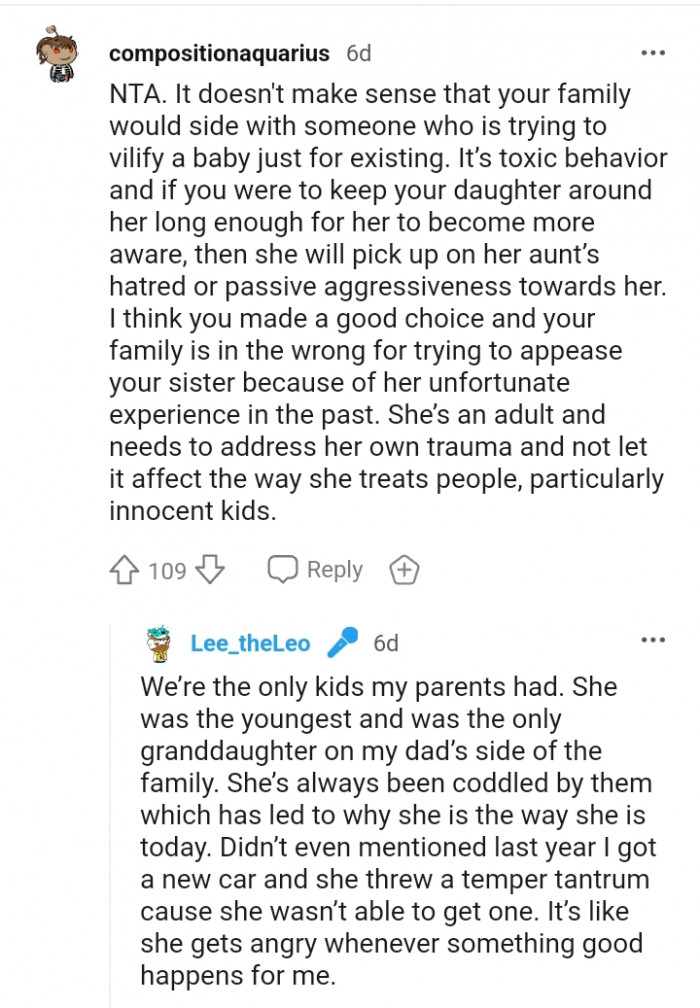
What aunt would treat her niece like that?
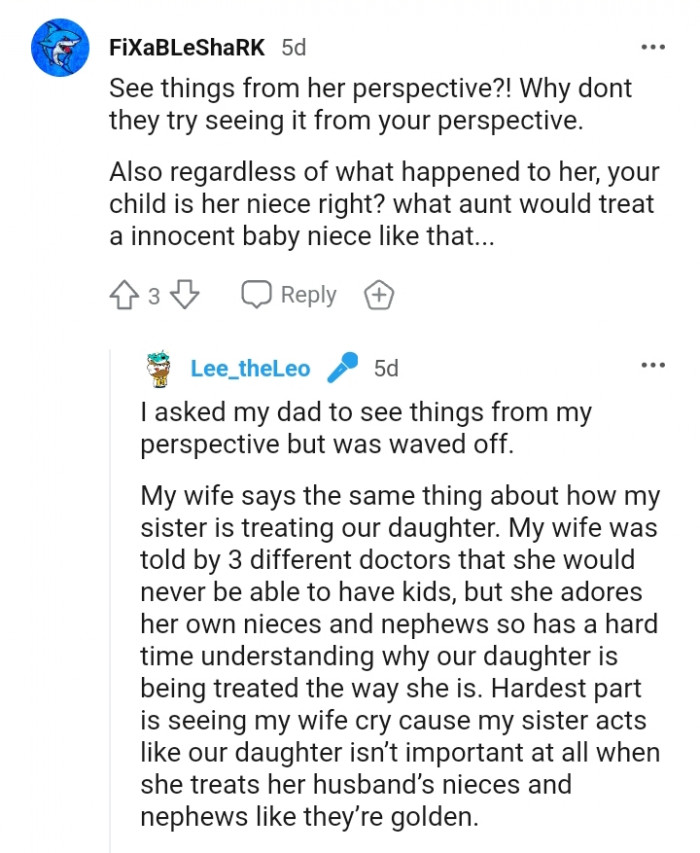
The Influence of Cultural Norms
Cultural factors significantly influence how jealousy is expressed and managed. Research from the University of Michigan indicates that collectivist cultures may view jealousy as a communal issue, while individualistic cultures may focus on personal responsibility.
This understanding can help individuals navigate their feelings within the context of their cultural background, promoting healthier coping strategies tailored to their social environment and relationships.
Sounds like she needs urgent therapy.
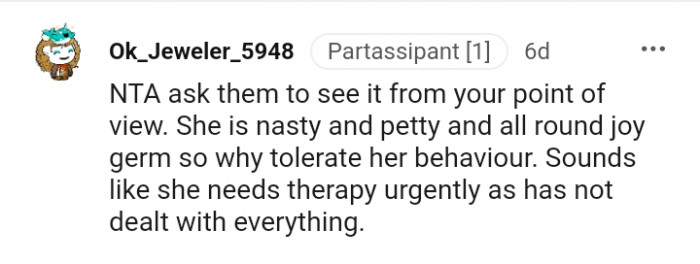
She is not handling her grief well enough.
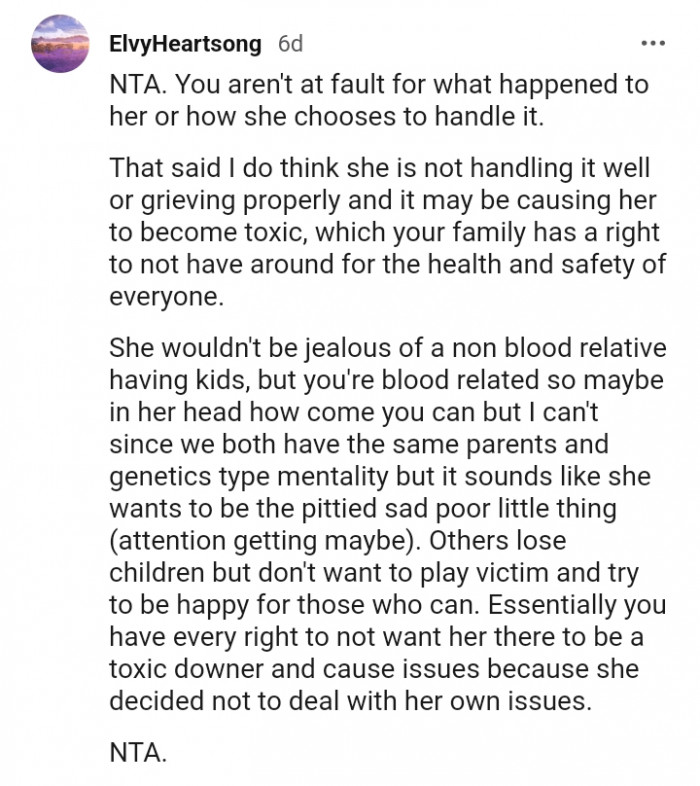
Life is too short to put up with misery.
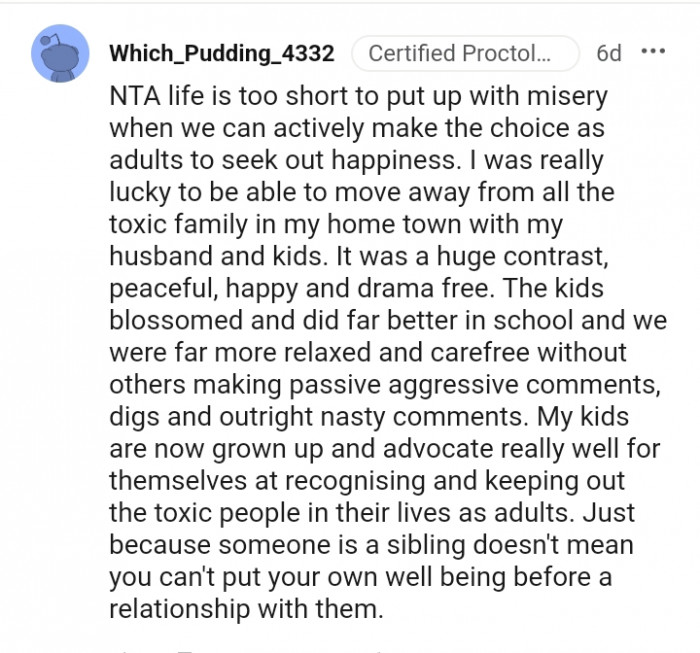
Emotional regulation is crucial for managing jealousy effectively. According to research published in Emotion, individuals who practice emotional regulation strategies, such as reframing and distraction, report lower levels of jealousy.
Engaging in activities that promote positive emotions, like exercise or hobbies, can also mitigate feelings of jealousy. Creating a supportive environment where individuals feel safe to express their emotions is essential for fostering healthy relationships.
Your parents may have to make the choice.
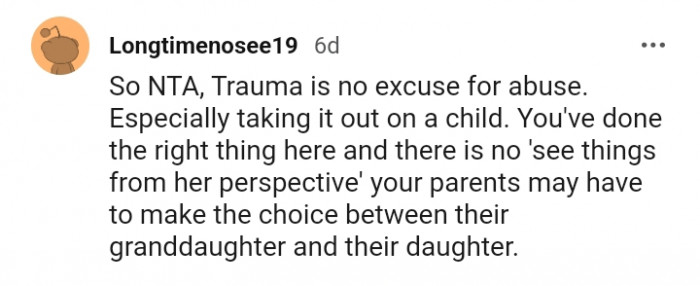
The OP's sister has always been the center of attention.
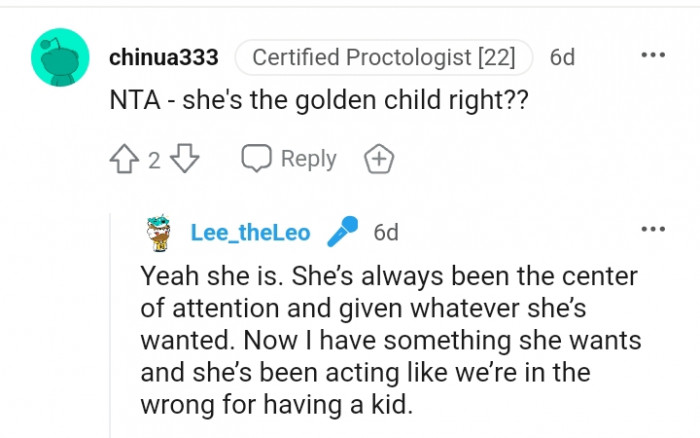
Having a baby is a beautiful thing, and the OP's sister should at least be happy for her brother. The OP even mentioned that she has no problem being around her husband’s nieces and nephews.
So why does it seem like she’s mad that the OP has a kid? Do drop your thoughts about this story in the comments below.
Psychological Analysis
This behavior exemplifies how jealousy can manifest in unhealthy comparisons within family dynamics, often rooted in individual insecurities.
From a psychological perspective, it’s essential to address these feelings constructively to promote healthier interactions and reduce conflict.
Analysis generated by AI
Analysis & Alternative Approaches
Jealousy and insecurity can significantly impact familial relationships and individual well-being.
Research indicates that fostering a culture of support and celebration can mitigate these feelings and strengthen family dynamics.
Ultimately, recognizing individual strengths and achievements is vital for cultivating positive family relationships.
Understanding the Deeper Patterns
Understanding jealousy through a psychological lens reveals both its origins and potential resolutions. Research from the American Psychological Association highlights that acknowledging and discussing these feelings can lead to healthier relationships.
Furthermore, integrating emotional regulation strategies and fostering open communication can transform jealousy into a catalyst for growth rather than conflict. By addressing underlying insecurities and practicing empathy, individuals can create stronger, more resilient connections.



